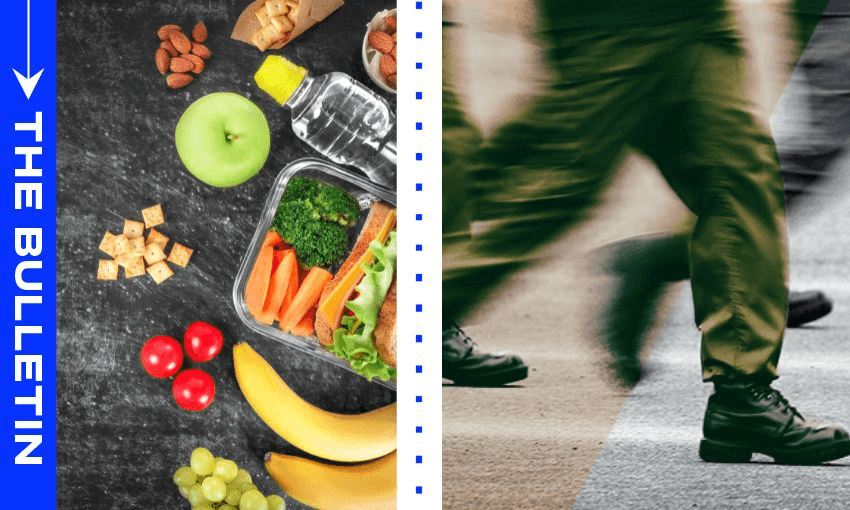As experts backed the efficacy of the lunch programme and politicians asked questions in the House yesterday, the minister for children announced a boot camp pilot for youth offenders, writes Anna Rawhiti-Connell in this excerpt from The Bulletin, The Spinoff’s morning news round-up. To receive The Bulletin in full each weekday, sign up here.
‘Spend less money to get more results’ – Seymour on lunches
The last oral question in the House yesterday came from Labour’s education spokesperson, Jan Tinetti, addressing the school lunch programme. Associate minister of education, David Seymour once again underlined his desire for “robust, statistically significant comparison that has been able to find that the programme has increased attendance at school.” The programme is not being “cut”, but Seymour said they want it to “spend less money to get more results.” Gabi Lardies has written a very good and comprehensive piece for The Spinoff this morning explaining who gets the lunches, what they cost, what’s in them and what teachers and principals say about its impact.
The baby and the bathwater – opposition and latest support
The government is looking for savings so there’s a start point for why this programme is under fire. Finance minister Nicola Willis has again described the lack of funding beyond this year as “an enormous fiscal cliff”. It has been the subject of questions well before now, and not just from opposition parties over the years. Justin Latif canvassed opinions at a South Auckland school in 2021 where parents raised concern about variation and quality. A Treasury report published last year found 12% of lunches were wasted. Seymour misquoted that figure on Checkpoint on Monday, saying it was 25%. Tinetti referenced the Ministry of Education yesterday, saying that wastage had halved to 6%. The Herald’s Kate MacNamara has previously unpacked issues around targeting (paywalled). The programme has had teething problems. Seymour wants evidence that government paying for lunch has educational outcomes, essentially divorcing the programme from the broader good of addressing food poverty. Because of the cost (and underpinning ideology), there’s a bid to find a direct line between attendance and free pasta salad. Unless you put every kid getting the lunches under strict labatory observation for several years and ignored every other thing going on in their lives, it might be tricky to point to the precise evidence that would suffice.
‘The honest tool’ tells us kids living in food poverty are up to four years behind kids who aren’t
In a Public Health Expert Briefing issued yesterday by Pippa McKelvie-Sebileau and Boyd Swinburn, attention was drawn to New Zealand’s 2022 Pisa results. For the first time, the PISA study included measures of food poverty. New Zealand ranked second worst in the OECD for the number of students missing meals due to lack of money, and achievement for students in food poverty was up to four years behind their food-secure peers, even after accounting for socioeconomic deprivation. McKelvie-Sebileau and Swinburn write that the school lunch programme is an effective intervention and a major safety net against food poverty for students. In an interview with RNZ’s Kathryn Ryan recently, education minister Erica Stanford described Pisa as “the honest tool” that tells us “relative to other countries, and not only relative to other countries but in terms of just our own performance, we are sliding.”
A military-style academy for youth offenders is coming…in June
While the school lunch programme in its current form is under review, the government made another youth-related announcement yesterday, heralding a pilot, coming in the middle of the year, of a military-style academy for youth offenders to be run by Oranga Tamariki. The Ombudsman called for a complete overhaul of Oranga Tamariki two weeks ago. Stewart Sowman-Lund looked at the arguments for and against boot camps when National put the policy on the table in 2022, raising questions of evidence. Greens co-leader Marama Davidson said it had been proven “time and time again” military-style academies did not resolve the drivers of crime.” Minister for children Karen Chour said the acadamies will have a military-style component as well as a rehabilitative and trauma-informed care approach to help these young people turn their lives around and reduce their risk of reoffending.” The crack down is part of the coalition government’s 100 day plan, she said. The 100 day plan says “Begin work to crack down on serious youth offending.” The deadline for ticking off everything on the list is Friday, so you could say the crack down has begun.
